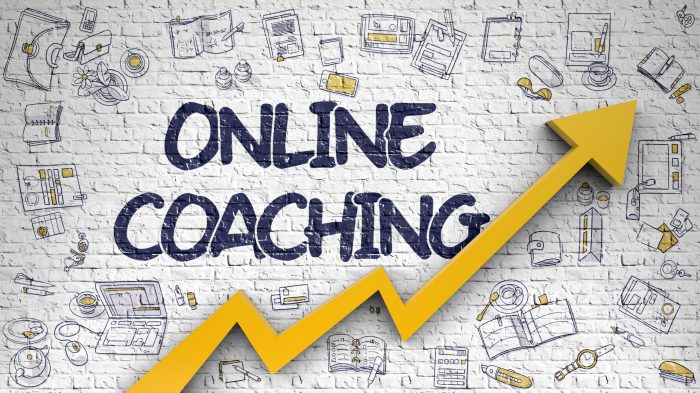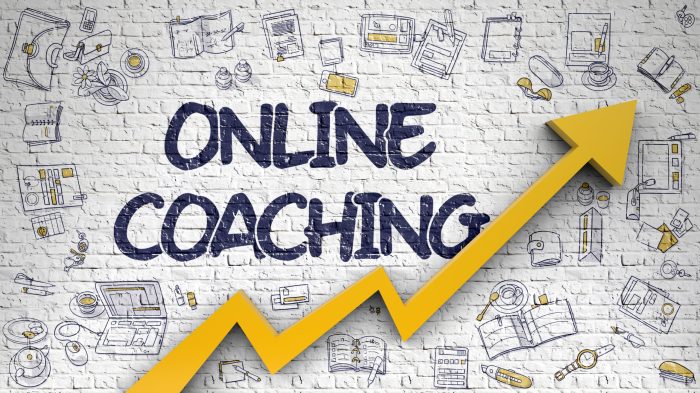Online Coaching is exploding! Forget stuffy offices – we’re talking personalized guidance delivered straight to your laptop. Whether you’re aiming for a career boost, a healthier lifestyle, or conquering your inner demons, online coaching offers flexibility and accessibility like never before. This guide dives deep into the world of online coaching, from choosing the right platform to building a thriving business.
Let’s get started!
This guide covers everything from defining online coaching and exploring its various niches to mastering marketing strategies, managing clients effectively, and navigating the legal and ethical considerations. We’ll also explore the various tools and technologies that power this dynamic industry, helping you understand how to build a successful online coaching practice.
Marketing and Client Acquisition

Landing clients for your online coaching business requires a multifaceted approach. It’s not just about building a website; it’s about strategically reaching your target audience and persuading them that you’re the right coach for them. This involves a combination of effective marketing strategies and a well-defined client acquisition funnel.Effective Strategies for Marketing Online Coaching ServicesSocial media marketing, content marketing, and email marketing are key strategies for reaching potential clients.
Each platform offers unique opportunities to connect with your ideal audience and showcase your expertise. For instance, Instagram might be ideal for visually showcasing your coaching style and building a community, while LinkedIn is better suited for connecting with professionals seeking career advancement coaching. Content marketing, through blog posts and articles, establishes you as a thought leader and attracts organic traffic to your website.
Email marketing allows for direct communication with potential clients, nurturing leads and building relationships.
Social Media Marketing Strategies
Social media marketing involves creating engaging content that resonates with your target audience. This includes using high-quality images and videos, running targeted ads, and engaging with your followers. For example, a life coach might post inspirational quotes and short videos about managing stress, while a business coach could share tips on productivity and leadership. Consistent posting and interaction are crucial for building a strong online presence and fostering community.
Content Marketing Examples
Creating valuable content establishes your credibility and attracts potential clients organically. This could involve writing blog posts about common challenges faced by your target audience and offering solutions, creating downloadable resources like checklists or workbooks, or producing podcasts or webinars. For example, a fitness coach could create blog posts on nutrition and workout routines, while a financial coach could offer downloadable budgeting templates.
The key is to provide high-quality, relevant content that addresses your target audience’s needs and pain points.
Email Marketing Best Practices
Email marketing is a powerful tool for nurturing leads and converting them into paying clients. This involves building an email list by offering valuable lead magnets (e.g., free e-books, webinars), segmenting your list based on interests and needs, and sending targeted email campaigns. For instance, you could send a welcome email series to new subscribers, a series of emails showcasing your coaching programs, and regular newsletters with valuable content.
Personalization and consistent communication are essential for building strong relationships with your subscribers.
Building a Strong Online Presence
A strong online presence is crucial for attracting clients. This involves creating a professional website that showcases your expertise, building a strong social media presence, and optimizing your online content for search engines (). Your website should clearly communicate your services, your target audience, and your unique selling proposition (USP). A well-designed website, combined with consistent social media engagement and high-quality content, will significantly increase your visibility and attract potential clients.
Client Acquisition Funnel
A client acquisition funnel is a structured process for guiding potential clients from awareness to conversion. It typically involves stages like awareness (attracting attention through social media or content marketing), interest (engaging potential clients with valuable content), decision (offering a free consultation or trial), and action (converting leads into paying clients). Each stage requires different marketing tactics and content.
For example, a fitness coach might use Instagram to raise awareness, offer a free workout plan to generate interest, conduct a free consultation to help clients make a decision, and then convert them into paying clients through their online coaching program. Tracking your funnel’s performance allows you to optimize your marketing efforts and improve conversion rates.
Legal and Ethical Considerations: Online Coaching

Navigating the world of online coaching requires a solid understanding of legal and ethical responsibilities. Ignoring these aspects can lead to significant problems, from client disputes to legal action. Building a successful and sustainable coaching business necessitates prioritizing ethical conduct and legal compliance from the outset.
This section Artikels key legal and ethical considerations for online coaches, focusing on privacy, confidentiality, contracts, and best practices for maintaining a trustworthy and professional online coaching practice.
Client Privacy and Confidentiality
Protecting client privacy and maintaining confidentiality is paramount. This involves securely storing and handling all client data, including personal information, session recordings, and communications. Coaches should have a clear privacy policy outlining how client data is collected, used, and protected, complying with relevant data protection laws like GDPR (in Europe) or CCPA (in California). This policy should be readily available to clients.
Furthermore, coaches should encrypt sensitive data, use secure communication platforms, and implement measures to prevent unauthorized access. Failing to adequately protect client information can lead to serious legal repercussions and damage your reputation.
Terms and Conditions
A comprehensive and clearly written set of terms and conditions is essential for any online coaching business. These terms should Artikel the scope of services, payment terms, cancellation policies, intellectual property rights, limitations of liability, and dispute resolution procedures. They protect both the coach and the client by establishing clear expectations and reducing the risk of misunderstandings or disputes.
A well-crafted agreement provides a legal framework for the coaching relationship, ensuring transparency and accountability. It’s advisable to have a lawyer review your terms and conditions to ensure they are legally sound and compliant with all applicable regulations.
Creating Legally Sound Contracts
A legally sound contract for online coaching services should be detailed and unambiguous. It should clearly define the services provided, the payment schedule, the duration of the coaching engagement, and any other relevant terms. It should also include clauses addressing confidentiality, intellectual property rights, termination provisions, and dispute resolution mechanisms. The contract should be easily understandable for both parties.
Consider including a clause specifying the jurisdiction governing any disputes. Using a standardized contract template from a reputable source, or consulting with a legal professional to create a bespoke contract, is highly recommended. A poorly written contract can lead to costly legal battles and reputational damage.
Measuring Success and Growth

So, you’ve launched your online coaching business – congrats! Now the real work begins: tracking your progress and making sure you’re heading in the right direction. Measuring success isn’t just about making money; it’s about understanding what’s working, what’s not, and how to consistently improve your services and reach more clients. This section will break down key strategies for monitoring your growth and making data-driven decisions.
Key Performance Indicators (KPIs) for Online Coaching Businesses
Tracking KPIs provides a clear picture of your business health. By regularly monitoring these metrics, you can identify trends, celebrate successes, and address challenges proactively. Different KPIs will be more relevant depending on your specific coaching niche and business goals, but some universally valuable metrics include client acquisition cost (CAC), customer lifetime value (CLTV), conversion rates (from lead to client), and revenue growth.
Analyzing these metrics together gives a holistic view of your business performance. For example, a high CAC might indicate a problem with your marketing strategy, while a low CLTV might suggest issues with client retention. Understanding the interplay between these KPIs is crucial for strategic decision-making.
Measuring Client Satisfaction and Engagement
Happy clients are essential for long-term success. Tracking client satisfaction and engagement provides valuable insights into the quality of your coaching and areas for improvement. Methods include collecting client feedback through surveys (both during and after the coaching program), monitoring client participation in group sessions or online forums, and analyzing client retention rates. A high Net Promoter Score (NPS), for example, indicates strong client loyalty and satisfaction.
Low engagement, on the other hand, might signal a need to revise your program content or delivery methods. Regularly soliciting feedback and actively responding to concerns demonstrates your commitment to client success and builds stronger relationships.
Strategies for Continuous Improvement and Growth
Continuous improvement is the lifeblood of a thriving online coaching business. This involves regularly reviewing your KPIs, client feedback, and market trends to identify areas for optimization. Strategies include refining your coaching materials, experimenting with new marketing techniques, improving your client onboarding process, and exploring opportunities for expansion, such as offering new coaching programs or expanding your reach to new markets.
For example, if your client feedback consistently points to a lack of clarity in a specific module, you can revise that module to improve understanding and results. Regularly adapting your strategies based on data and feedback ensures that your business remains competitive and relevant.
Analyzing Data to Identify Areas for Improvement and Optimization
Data analysis is not just about crunching numbers; it’s about interpreting the information to inform strategic decisions. This involves using tools and techniques to visualize your KPIs and client feedback, identify trends and patterns, and pinpoint areas needing improvement. For example, if your conversion rate from free consultation to paid coaching is low, analyzing the consultation process might reveal areas for improvement, such as clarifying your pricing or addressing client concerns more effectively.
Simple spreadsheet software can be sufficient for smaller businesses, while more sophisticated analytics tools might be necessary for larger operations. The key is to consistently track your data, analyze the results, and use that information to make informed decisions that drive growth.
Question & Answer Hub
What’s the average cost of online coaching software?
It varies wildly depending on features and the number of clients. Expect to pay anywhere from free (with limited features) to several hundred dollars a month for robust platforms.
How do I find my niche in online coaching?
Identify your passions and expertise. What are you uniquely qualified to help others with? Research market demand for your chosen niche to ensure there’s a potential client base.
What are some common mistakes new online coaches make?
Underpricing services, neglecting marketing, not setting clear boundaries with clients, and lacking a strong online presence are all common pitfalls.
How important is client testimonials?
Crucial! Positive testimonials build trust and credibility. Encourage satisfied clients to leave reviews on your website and social media.
What legal documents should I have in place?
At minimum, you need a contract outlining services, payment terms, and confidentiality agreements. Consult with a legal professional for specific advice.
